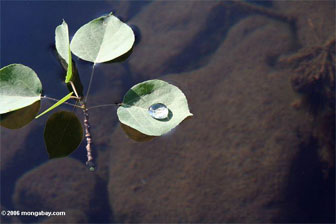Climate change causing early spring
Climate change causing early spring
mongabay.com
August 25, 2006
Spring is arriving earlier across Europe than it did 30 years ago according to new research published in the journal Global Change Biology.
Scientists from 17 nations examined 125,000 studies involving 561 species and found that spring is beginning on average six to eight days earlier than it did 30 years ago. The researchers said that in countries where rapid increases in temperature have occurred, “that figure is almost doubled.”
 Photo by R. Butler.
|
“Unlike some studies that record individual species, this is the first comprehensive examination of all available data at the continental scale, using around 550 plant species, and the timing change is clear, very clear,” said lead researcher Dr Annette Menzel from the Technical University Munich in Germany.
“Not only do we clearly demonstrate change in the timing of seasons, but that change is much stronger in countries that have experienced more warming.” added co-author Dr Tim Sparks of the Center for Ecology & Hydrology in the UK. “Many plant species grow throughout Europe, so, for example, a direct comparison of the flowering date of wild cherry which is two weeks earlier in the UK with that in Austria which is only 3 days earlier is possible with this huge dataset.”
The researchers say the shift was most evident in spring but the warmer temperatures have also delayed autumn (fall) by an average of 3 days over the past 30 years.
Sparks told BBC news that the findings show that there is “a direct link between rising temperatures and changes to plant and animal [behavior]” but “did not go as far as pointing the finger of blame at human-induced climate change.”
RELATED ARTICLES
July was second-hottest month in U.S. history
July was second-hottest month in U.S. history according to the National Climatic Data Center (NCDC). The average temperature for the 48 contiguous states was 77.2°F and more than 2,300 daily temperature records were broken across the country.
California butterflies disappear, climate change may have impact
2006 is looking like it could be the worst year in memory for California’s butterflies due to cold and wet conditions in late winter, says Art Shapiro, a professor of evolution and ecology at the University of California, Davis. His observations raise concerns that future climate change could lead to declines in the state’s native buttefly populations.
2005 was the warmest year on record
A new study by NASA indicates that 2005 was the warmest year in at least a century, surpassing 1998. According to their data, the five warmest years over the last century have occurred since 1997: 2005, then 1998, 2002, 2003 and 2004. NASA also announced that over the past 30 years, the Earth has warmed by 0.6 degrees C or 1.08 degrees F, and 0.8 degrees C or 1.44 degrees F over the past 100 years.
Earth at Warmest in 400 Years
There is sufficient evidence from tree rings, boreholes, retreating glaciers, and other “proxies” of past surface temperatures to say with a high level of confidence that the last few decades of the 20th century were warmer than any comparable period in the last 400 years, according to a new report from the National Research Council. Less confidence can be placed in proxy-based reconstructions of surface temperatures for A.D. 900 to 1600, said the committee that wrote the report, although the available proxy evidence does indicate that many locations were warmer during the past 25 years than during any other 25-year period since 900. Very little confidence can be placed in statements about average global surface temperatures prior to A.D. 900 because the proxy data for that time frame are sparse, the committee added.
This article is based on a news release from the Centre for Ecology & Hydrology. It uses a quote from “Climate blamed for early springs” which appeared on the BBC News website on Aug 25 2006.